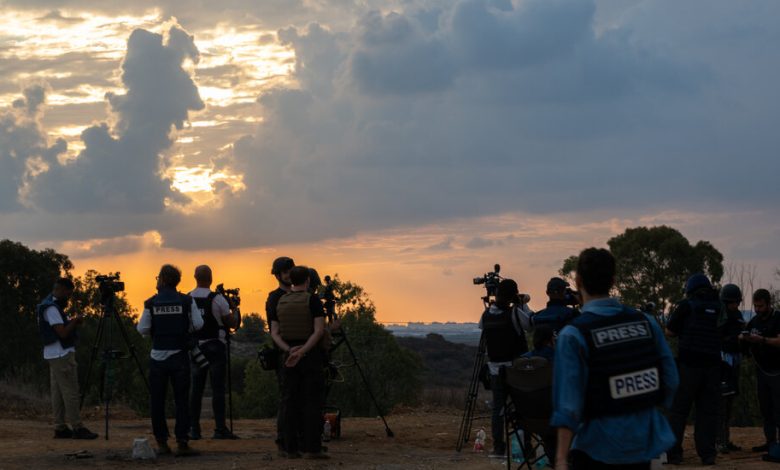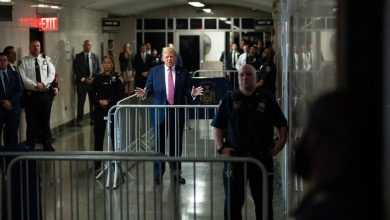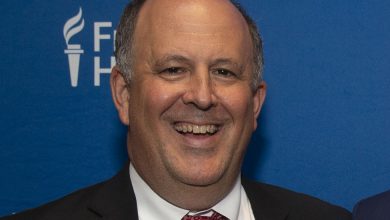Some Israeli Journalists Express Fear About Conveying Dissenting Views

Last weekend, at least a dozen people surrounded the home of a left-wing Israeli commentator who had expressed concern about civilian deaths in Gaza, shouting “traitor” and firing flares in his direction.
This week, a prominent right-wing activist posted a video of himself shouting at and threatening members of a TV crew that was filming Israeli soldiers. Other journalists say they are getting threats and being harassed on social media.
In Israel, many journalists are covering the war while processing their own grief and shock over the surprise attacks by Hamas on Oct. 7. Some lost relatives in the attacks.
But some Israeli journalists and supporters of the press say that covering the war has become even more difficult because of the vitriol they have received from fellow Israelis who have been upset by their questioning of the country’s actions in response to the Hamas attacks.
Expressing dissenting opinions has become even more fraught than in previous conflicts, said Anat Saragusti, a senior staff member for the 1,500-member Union of Journalists, an Israeli organization with 1,500 members.
“It has a chilling effect,” Ms. Saragusti said.
Journalists and media experts attributed the change to several factors: The attacks by Hamas have been especially traumatizing for Israelis. The media environment has grown more polarized in recent years. And the spread of misinformation, particularly on WhatsApp and social media platforms like Facebook and X, formerly known as Twitter, has intensified existing viewpoints.
“There are fewer people voicing opposition to the Israeli operation,” said Natan Sachs, the director of the Center for Middle East Policy at the Brookings Institution in Washington. “There is much more vitriol toward those who do.”
Mr. Sachs noted that the polarized media environment was not unique to Israel, although it has increased in the country in recent years, in part because Prime Minister Benjamin Netanyahu has made the press a focus of his energy. Two of three criminal cases that Mr. Netanyahu has been involved in feature accusations of wrongdoing in pursuing positive media coverage, which he has denied.
“The last time we had a major operation in Gaza, the traditional media was still not that polarized,” said Tehilla Shwartz Altshuler, a senior fellow at the Israel Democracy Institute, a nonpartisan research group, referring to 2014. She said that people had hardened their views because they were often consuming news that aligned with their views, particularly online.
“That’s the fourth dimension of the war,” she said. “It’s not just on the ground or by sea or by air force. It has to do with the cyber-dimension that creates different influences on our ability to understand reality.”
Dr. Shwartz Altshuler is among those researching ways to make journalists in Israel feel safer while they are reporting information that is critical of the government’s policies and Israel’s military. She helped start an organization that tracks attacks on journalists and protesters in Israel. More than 1,000 attacks have been reported since March of this year, she said.
Questions have swirled over a potential Israeli intelligence failure since the Oct. 7 attacks. American and Israeli officials have said that none of Israel’s intelligence services had specific warning that Hamas was preparing the sophisticated assault.
Tal Shalev, a political commentator and reporter for the Hebrew news site Walla, said she felt a duty to continue writing columns critical of the government and asking tough questions of officials, particularly about the missteps and misdoings of decision makers, even though she sometimes receives pushback on social media for doing so.
“There’s a sentiment here saying it’s not the time now to deal with malpractices and problems, and we should wait until after the war because now is the time to unite and not criticize the government,” Ms. Shalev said. “I don’t fully agree with that.”
“Of course, this is the time to unite,” she added. “I’m an Israeli citizen, and I’m hurting with my people and I want to win this war. I just don’t think that because of the war we should stop being alert and stop doing our jobs as journalists.”




